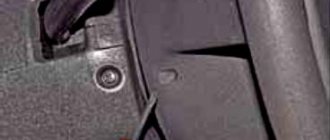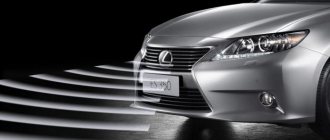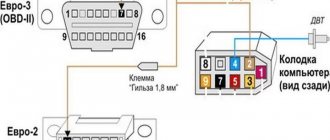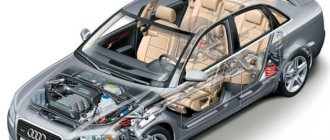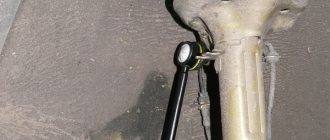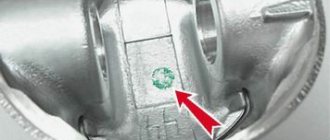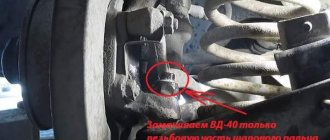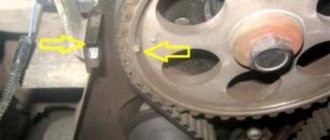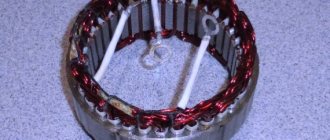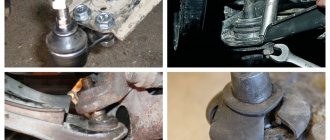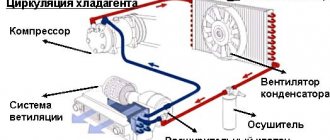In the article about whether old airbags will work, we promised to tell you how to independently check the presence of airbags in a car purchased on the secondary market. And today we will show you what to pay attention to and where to look so as not to buy a car in which the airbags have deployed. After an accident, in the vast majority of cases, no one changes them, so you can’t count on the former safety in a car without airbags.
Causal relationship
The need to deploy certain airbags is determined by the control unit of the passive safety system based on information received from impact sensors. Their locations vary depending on the make and model, and the calibrations may also vary. Therefore, in some cars, airbags deploy after a light impact, while in others they do not deploy during an accident, where the car receives significant damage. There were also situations when the airbags deployed when a wheel fell into a serious hole or when passing rails.
When properly configured, the front airbags will not deploy in the event of a side impact, rear impact or rollover. And vice versa: when hit by the front of the car, as a rule, the side airbags do not work. But each accident is individual; even in a collision between two cars of the same model, different numbers of airbags may inflate.
However, they are usually triggered by a serious blow. The only exception is the side curtains, which often open with a fairly light poke in the side and protect passengers from the possible scattering of glass fragments.
But the impact that triggers the airbags is not always so strong that it leads to damage to the power elements of the body. During the repair, the car will receive, for example, a new wing, a bumper with an amplifier, high-quality painting - and without skills you will not see anything. And there’s nothing wrong with repairs if they’re done well. The only thing is that airbags that have been deployed are almost never replaced, because, unlike mounted body elements, they are not visible.
In order to avoid buying a car that has been in an accident in which the airbags deployed, you just need to be careful and know where to look and what to pay attention to.
Working principle of Airbag
The Airbag safety system includes not only airbags, but also sensors and a control unit.
- The sensors are installed on the car body. They can be electronic or mechanical.
- The control unit coordinates the operation of all elements of the security system. At the right moment, it activates the airbags and the belt tensioning mechanism. The control unit also informs the driver of any faults in the system, including the corresponding indicator.
- Airbags only deploy in the event of a frontal collision with the vehicle. The airbag “inflates” in 20 milliseconds thanks to a harmless squib. And after 5-10 seconds the pressure begins to drop. The entire system only works when the key is in the ignition switch in the “ON” or “Start” position.
- The airbag mechanism consists of a hard and soft shell, as well as an inflator.
The computer is not a panacea
The first and easiest thing is to turn on the ignition and make sure that the so-called “pregnant man” orange on the dashboard lights up and goes out. But I haven’t seen a car in which the airbag indicator doesn’t light up for ten years. Today, even children are aware that to deceive the diagnostic system, it is enough to solder a resistor of the required resistance to the connector connected to the airbag. In this case, the light on the panel will light up properly in the absence of airbags.
In this option, there will be no errors in computer diagnostics, because the system is not able to figure out what the connector is connected to, as long as the resistance is correct. But if the person who restored the car after an accident for sale did not bother, the computer can easily detect Crash Data in the SRS unit. However, even if everything is fine according to the results of computer diagnostics, this is not a reason to relax. Moreover, it is often easier and faster to establish the fact of airbag deployment visually and tactilely than to connect a computer. Sometimes you can tell that there is a 99.9% probability that there are no airbags in a car just by opening the door, and in some cases this is clear even from photographs.
Let's start with the side pillows
If the car you're inspecting has window airbags, it's easiest to start with them. You can verify their presence or absence by removing the rubber seal at the top of the doorway.
To verify the presence of the curtain airbag, you need to remove the seal
Often, after triggering, the curtains are simply twisted at random and shoved into place. The factory pillow is clean, neatly rolled, and sometimes placed in a special case. Since the curtain is the same for both rows, there is no need to remove the seals both front and rear.
Curtain airbag not deploying
But not every seller will allow you to remove the seals, and besides, not every car simply pulls them down. You can understand the sellers: the seal, which no one has ever touched, stays in place very tightly. But if you constantly pull it off, it will begin to come off with almost the effort of your little finger. And not everyone knows that the seal needs to be compressed before installing it in place.
Cut window cushion
Therefore, we move on to a simple visual inspection of the upper part of the cabin - everything that is above the window line. First, we look at the ceiling: when the curtains are opened, a hall often forms on its lining almost along its entire length. But precisely often – not always.
Ceiling panel without damage
Next, we turn our attention to the rack trim. Sometimes their fasteners break when the curtains are opened, sometimes this is done by crooked craftsmen. Naturally, fasteners can break even in the event of a strong side impact. Therefore, if the plastic on the stands is based on your word of honor, don’t expect anything good.
On the central pillars there are often plugs with the inscription Airbag. When removing the trim, few people manage to remove them without leaving marks.
Plug without signs of dismantling
Therefore, if you see characteristic marks on the plugs, it means they were taken out. And there is no reason to go there for reasons not related to body repair.
Damaged plug
Let's move on to the side airbags located in the backs of the front seats. Previously, they were often simply installed on the sides of the backrests in plastic cases, but in modern cars this solution has long been abandoned. Today, airbag cassettes are hidden under the skin and are usually tactilely perceptible. When you feel the sidewall with your hand, you can easily find the rectangular plastic housing of the pillow module. If it's not there, you won't feel anything. You should touch the outer sides of both front seats - everything should be the same.
The side cushion modules are located in the central parts of the sidewalls of the backrests
Some car models have zippers on the upholstery at the back of the seats. In this case, everything is extremely simple: unfasten the lock at the outer edge and see if the airbag cassette is in place.
Both side airbags are in place
The operation of the side airbag can also be indicated by vertical seams at the corner of the back that differ from the rest. When the airbags are deployed, they inevitably rip, and the chair has to be stitched up. Another sign that may alert you is fresh, thick seat covers. Once I happened to see a picture where a triggered airbag was hidden under such a leatherette cover. They didn't even bother to cut it and sew up the chair - they just put a cover on top. Let's take it off - and good evening!
But not in all cars the airbag module in the seat can be felt. For example, on the Renault Scenic II the sidewalls are so thick that it is difficult to feel anything underneath them. In the same model, there is a special slot in the back, through which the airbag opens in the event of an accident. It is into this that you should stick your palm in search of the cassette.
Also, during the inspection, it will not be superfluous to take a flashlight and look under the front seats. You should see latched connectors with no foreign objects on the pads. By foreign objects, we, of course, mean resistors.
And there may be two resistors there, because under the seat there is wiring not only to the cushion, but also to the seat belt pretensioner squib, which is usually located under the belt buckle. If the connector is disconnected and there is resistance sticking out in it, everything is obvious. If connected, make sure that there is no resistor outside the block.
The role of other sensors
Some cars additionally have a fuel pump shutdown sensor. With it, in mild collisions, the air bags do not work, but the sensor turns off the fuel pump and it becomes possible to start the car only after activating this detector.
Incorrect operation of the airbag may be due to a malfunction of the passenger presence sensor (usually located under the seats) and if one is present in a specific car brand. These detectors determine the weight and position of those sitting, as well as which side of the impact (side, frontal), in order to optimally select the inflation speed, shape, and use different airbags.
We carefully examine the steering wheel and dashboard
Let's move on to the front airbags. We said above that sometimes their absence can be determined simply by opening the door, and sometimes without even opening it - just look at the dashboard. If you see a car of a particular model in front of you for the first time, you are unlikely to understand anything, but if you look at five or ten identical ones, the overtightened panel will attract attention.
Although it also happens that, even having never seen the interior of a car before, one can say that the dashboard in it has been retightened, it is done so badly. This type of repair can actually be seen in the photographs.
Replacing the panel trim with a 99.9% probability indicates that the front airbags deployed in the car. After all, there is simply no other reason to drag it out.
At a time when, as is commonly believed, engineers, not marketers, ruled the roost in the auto industry, passenger airbags were simply hidden behind a cover on the panel. In the event of an accident, the airbag lifted the lid and successfully opened towards the passenger. After an accident, it was enough to change that same cover - and no traces remained.
But later someone decided that these caps looked ugly and spoiled the appearance of the interior. Then they began to make the dashboard trim in such a way that a specially weakened zone appeared in it, which the cushion breaks during the deployment process. Naturally, after such a development of events, you can’t change the lid - you either have to change the entire panel, which is expensive and labor-intensive, or retighten it.
The replaced panel does not stand out in any way; only traces of dismantling adjacent elements and signs indicating the unscrewing of the fasteners can give it away. But they rarely take this path.
Sometimes an overstretched panel is not noticeable if the texture of the material is close to the factory one. The easiest way to detect the fact of constriction is to gain access to those places where the edge of the finishing material is located. For example, at the junction of the door and the dashboard there is often a removable cover, after removing which you can see the edge of the upholstery. If you see factory material there, and on top of it there is another layer of the same material, this is a reupholstery.
Also, the overstretched panel is indicated by peeling of the material, bubbles underneath it, and crooked Airbag inscriptions.
Let us remind you once again that when the passenger airbag deploys, the panel tears. Before re-tightening, it must be restored, otherwise everything at the break point will be crooked and askew. For this, banal putty is often used. As a result, in the place where the pillow should open, the panel becomes hard. That is, when palpated, the entire dashboard is soft, but in the airbag area it is hard.
If there are no obvious signs of panel tightening, and it could have been removed, for example, to replace the stove fan, you need to try to make sure that the passenger airbag is in place. Often the airbag module is visible through the same cover on the side of the dashboard, and it can also be seen by removing the glove box, which is done easily on some models. In cars with glove compartments, which are a solid box with a lid that has no top, you can even reach the airbag module with your hand. By touch you can be sure that there is a cassette, if, of course, you can reach it, and that the connector is connected to it and is not hanging separately with a soldered resistor.
Ford Focus 3 passenger airbag. You can’t see it without removing the glove compartment, but you can feel it or take a picture with your phone
But it’s much better not to demonstrate gutta-percha in your hands and bend over backwards trying to look behind the glove compartment (and it’s not a fact that the seller will let you remove it), but to use a small mirror on the handle and a flashlight. With their help, in principle, you can see a lot in the car that is not obvious during a simple eye examination.
Finally, the driver's airbag. It is impossible to verify its presence without disassembling the steering wheel. But there are factors indicating that it will work. In particular, the central pad on the steering wheel should stay firmly in place and not dangle.
There's nothing wrong with this cover
In addition, when the airbag deploys, the pad tears, and it is not always replaced. Sometimes they simply remove the manufacturer’s logo, solder it, glue it inside, tighten it and glue the badge in place. In this case, repairs may be indicated by unevenness under the finishing material, its loose fit, and traces of glue protruding from under the logo.
The cover of this steering wheel has play at the bottom
To replace the airbag after an accident, it must be removed along with the pad. Therefore, it will be useful to inspect the mounting bolts for signs of unscrewing them. On some models, the bolts are hidden under the steering wheel casing; to access them, you need to pierce it with an awl or a knitting needle. Such punctures immediately indicate interference with the steering wheel design. On other cars, the fasteners may be covered with plastic plugs, which often leave marks when removed. Well, in some cars the trim is secured with latches.
But the fact of disassembling the steering wheel is not always associated with an accident. It can be removed for reupholstery or painting.
There are also signs indicating that the front airbags are deployed, which do not require going deep. Everyone can see them. The first is a replaced windshield. Of course, if the car is 10 years old, several glasses could have been replaced due to their operational wear: chips, cracks, etc. But if you are looking at a new car, 1-3 years old, then the replaced windshield should be annoying. Of course, glass can be broken if you drive 10 km from the car dealership. But very often the “lobash” is broken by a deployed passenger airbag. In this case, the glass may partially crumble. If you see non-original glass or original glass, the year of manufacture of which does not coincide with the year of manufacture of the car, look into the air duct under the windshield. There may be fragments left in it. They do not mean 100% deployment of the airbags, because glass can crumble even if hit by a large stone, but they are a reason to be wary, because they may indicate a serious accident. True, I have repeatedly seen cars after serious accidents with airbags deployed, in which the “original” windshield remained intact.
In addition to the air ducts under the windshield, it is worth paying attention to the side ones, in particular, those through which the mirror areas are blown. When the airbag is deployed, the talc with which it is coated scatters throughout the cabin. Of course, there is not much of it, it can be easily removed from most surfaces, but air ducts are often forgotten. If you see traces of white powder there, this may indicate that the airbags have been fired.
